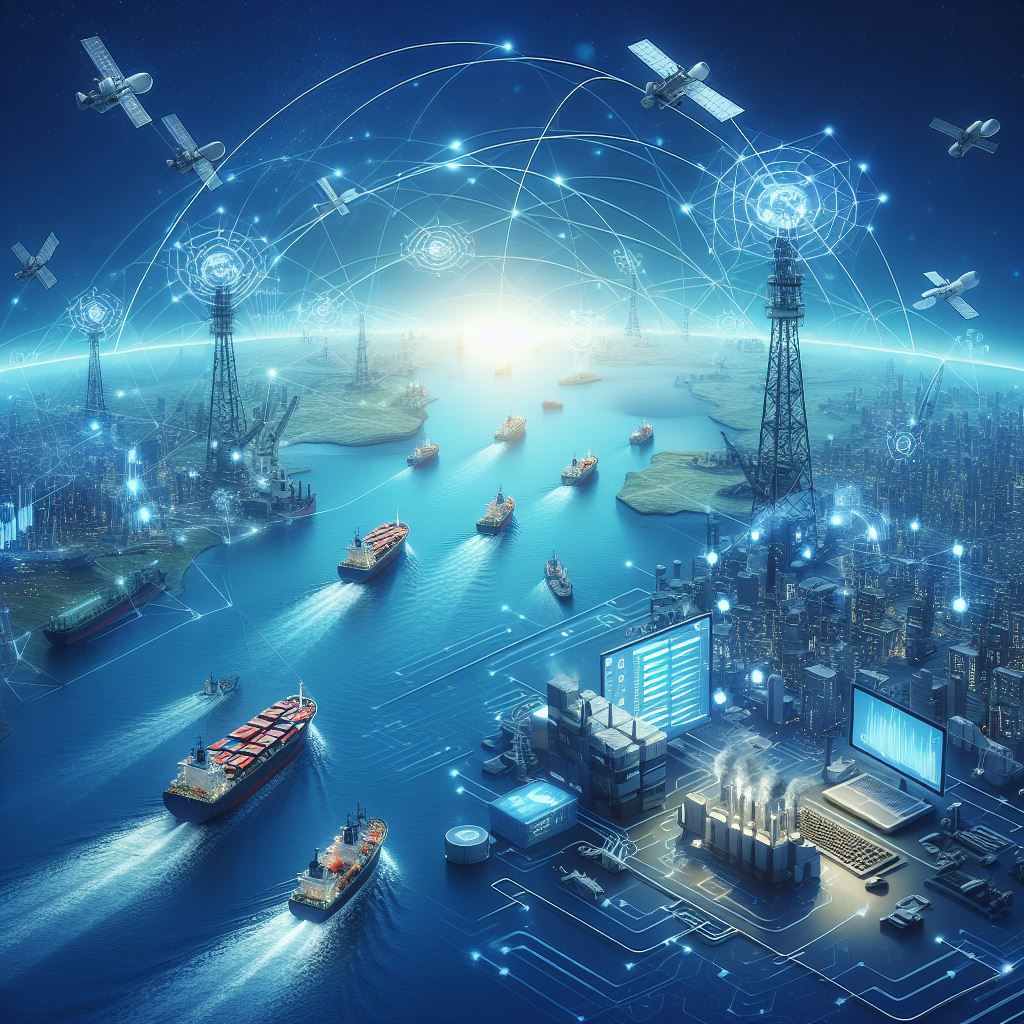What is Smart Maritime?
“Smart maritime” represents a transformative shift in the maritime industry, integrating advanced technologies to enhance efficiency, safety, sustainability, and overall operations. This paradigm shift is driven by a convergence of innovations that revolutionise traditional practices, ensuring a more connected, efficient, and sustainable maritime sector.

At its core, smart maritime combines cutting-edge technologies with maritime operations. These technologies encompass a wide spectrum, including but not limited to:
- Automation and Autonomous Systems: Incorporating autonomous vessels or integrating automation into maritime processes to optimize operations and reduce human error. This includes automated navigation, cargo handling, and maintenance procedures.
- Internet of Things (IoT) and Sensor Integration: Deploying sensors and IoT devices throughout vessels to collect real-time data on various parameters, such as engine performance, cargo conditions, weather, and environmental factors. This data facilitates informed decision-making and predictive maintenance strategies.
- Big Data Analytics: Utilizing advanced analytics tools to process and analyze the vast amounts of data collected from ships. This aids in optimizing routes, predicting maintenance needs, enhancing fuel efficiency, and improving overall performance.
- Remote Monitoring and Control: Enabling remote monitoring and control capabilities, allowing onshore personnel to oversee vessel operations, troubleshoot issues, and make real-time adjustments, thereby increasing operational efficiency and safety.
- Safety and Security Enhancements: Implementing AI-driven surveillance systems, cybersecurity measures, and predictive analysis to mitigate risks, prevent accidents, and enhance overall maritime safety and security.
- Environmental Sustainability Initiatives: Introducing eco-friendly technologies and practices, such as alternative fuels, emission reduction strategies, energy-efficient systems, waste management solutions, and environmentally conscious operations, to minimize the environmental impact of maritime activities.
Smart maritime initiatives are multifaceted, impacting various facets of the industry:
Efficiency Improvement: By leveraging automation, data analytics, and remote monitoring, smart maritime aims to streamline operations, optimize routes, reduce fuel consumption, and enhance overall efficiency. Predictive maintenance based on real-time data minimizes downtime and maximizes operational uptime.
Safety Enhancement: Advanced monitoring systems and predictive analytics contribute to proactive risk management, improving safety protocols and reducing the likelihood of accidents. Autonomous systems, when implemented securely, can reduce human error and improve safety at sea.
Environmental Sustainability: The integration of eco-friendly technologies and practices aligns with global efforts to reduce the environmental impact of maritime activities. Smart maritime solutions focus on reducing emissions, minimizing waste, and adopting cleaner energy sources, contributing to a greener industry.
Data-Driven Decision Making: The abundance of data collected from IoT devices and sensors onboard ships provides valuable insights. Analyzing this data enables stakeholders to make informed decisions, optimize operations, and anticipate maintenance needs, ultimately enhancing overall performance and profitability.
Industry Transformation: The adoption of smart maritime technologies represents a paradigm shift in the industry. It requires adapting to new methodologies, upskilling the workforce, and embracing technological advancements to stay competitive in a rapidly evolving landscape.
However, challenges accompany this transition. Implementing smart maritime technologies necessitates substantial investments, ensuring compatibility with existing infrastructure, addressing cybersecurity concerns, and navigating regulatory frameworks and standardization across the industry.
Additionally, concerns about the ethical implications of autonomous systems, data privacy, and the potential displacement of jobs due to automation require careful consideration and proactive measures.
In conclusion, smart maritime encapsulates a holistic approach that revolutionizes the maritime sector by harnessing technological advancements to improve efficiency, safety, sustainability, and decision-making processes. While presenting transformative opportunities, its successful implementation requires collaborative efforts, continuous innovation, and a balance between technological integration and industry-specific considerations. Smart maritime represents the future of a connected, efficient, and environmentally conscious maritime industry.
Please sign up for our weekly IoT Newsletter to have these articles direct to your inbox. Thanks for reading 😉